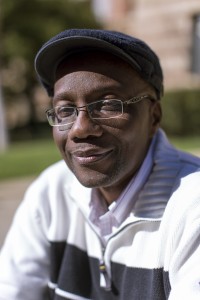About 40 years ago, Hughlin Boyd cried on the front stoop of his family’s Brooklyn apartment because his dream of attending college seemed so out of reach.
Boyd, a graduate student at the UCLA Graduate School of Education and Information Studies, has since earned three degrees, worked in politics for 10 years and been diagnosed with cancer. He is now working on a dissertation about American and international policies on accepting foreign refugees.
“If I could go back to that kid on the stoop, I would say, ‘Don’t worry, your time is coming,’” Boyd said.
Boyd, his two sisters and his grandmother moved to Brooklyn from Jamaica, their home country, after his mother passed away when he was a teenager. In high school, Boyd dreamed of a career in politics.
“He wanted to be the prime minister of Jamaica,” said Marlene Klotz, Boyd’s younger sister. “That was his dream when he was a young child.”
After graduating from high school, Boyd pursued a bachelor’s degree, a master’s degree and a law degree at various U.S. universities, and spent several years as an instructor in aerospace physiology in the U.S. Air Force.
In 1997, Boyd returned to Jamaica and spent 10 years in various government positions, including senior director for the Ministry of Local Government and senior adviser to the Minister of Water and Housing.
When he returned to the U.S., Boyd began to notice problems with his health and developed a lump in his neck. In 2010, doctors performed a biopsy and diagnosed him with stage 4 cancer of the esophagus.
The doctors in the hospital told his family to make preparations for his funeral, but Boyd said he refused to lose hope.
“When I was told I had cancer, I had an epiphany that all would be well,” Boyd said. “I never wavered from that belief, and decided to apply to graduate school while I’m recovering.”
Klotz describes him as someone who always sought education, and remembers learning to read by watching her brother read the Sunday newspaper.
“I was always watching and admiring him, hoping I could be as smart as he is,” Klotz said. “I’ve always put him on a pedestal.”
Boyd said he continues to experience health problems because of the aggressive chemotherapy treatment he received. He added he currently receives most of his food through a gastric tube in his abdomen.

“My esophagus is destroyed, my salivary gland is gone,” Boyd said. “It has messed up my bones, and (doctors said) it may have affected my eyes.”
After being diagnosed, Boyd applied to the UCLA Graduate School of Education and Information Studies and began taking classes in 2013.
“For me, grad school has been a place to recoup,” Boyd said.
Joaquin Noguera, a graduate student in the department of education, said Boyd was one of the first people he met in his doctoral program at UCLA. He added he was surprised to see a person of Boyd’s age in the program.
“I was delighted to learn that he was Jamaican, because I am also from the Caribbean,” Noguera said. “We just clicked, and we were friends from then on.”
After learning Boyd had cancer, Noguera said he felt a deeper connection to him because his own mother had passed away from cancer.
“I find that people who have been touched by death in the kinds of ways that he has … bring an appreciation to life that is really important,” Noguera said. “When tense things are happening, he’ll always find a way to lighten the situation.”
Boyd spent two to three days a week in the hospital, but still made the dean’s honors list, worked as a teaching assistant and took a 30-unit course load.
“He’s not going to be a complainer … even though he’s facing more challenges than most people in the school,” Noguera said.
In 2014, Boyd was awarded the department’s Distinguished Teaching Assistant/Special Reader Award and represented the department of education at the Dean’s Scholar Dinner.
Recently, Boyd decided to change the topic of his doctoral dissertation to focus on the refugee crisis in Syria after seeing a photo of a young Syrian boy. The boy’s body had washed up on a beach, after he drowned in an attempt to flee to Turkey.
Boyd, who is Jewish, said the refugee crisis reminds him of the Jewish people who fled from Germany during the Holocaust, and the countries in Europe who refused to take them in.
“I saw myself in those people there on the beach,” Boyd said. “I saw the same rhetoric, the same attitude about Syrians and I wondered if that was how it played out for the Jewish people.”
Boyd’s dissertation will focus on American and international policies toward accepting refugees, and whether the United States cherry-picks the refugees they accept based on their level of education.
“Someone has to stand up when there is injustice, and I wanted to participate in the discourse,” Boyd said. “I thought scholarship was my way of contributing.”

This is beautiful, Boyd. You are an incredible person.